| Srl | Item |
| 1 |
ID:
142687
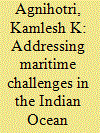

|
|
|
|
|
| Summary/Abstract |
The vastness and diversity of the Indian Ocean Region (IOR) and its littorals, and difference in the latters’ overall view of regional security, presents a broad spectrum of challenges therein. The maritime capacities of most littoral states are not strong enough to individually address these challenges. However, synergised response strategies, appropriately regulated by one or two collectively mandated apex bodies, would greatly help in managing regional maritime security. The existing maritime cooperative initiatives in IOR, like the Indian Ocean Rim Association (IORA) and Indian Ocean Naval Symposium (IONS), have shown great promise and potential. Countries like India and Australia, major players in both these constructs, can possibly rally other IOR littorals into leveraging their maritime capacities under these pan-regional fora by mutual agreement. Concurrently, both initiatives could find congruence in their maritime security visions, so as to create a collaborative local environment for collective benefits without dependence on extra-regional players.
|
|
|
|
|
|
|
|
|
|
|
|
|
|
|
|
| 2 |
ID:
122314
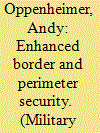

|
|
|
|
|
| Publication |
2012.
|
| Summary/Abstract |
International terrorism and insurgencies in area of conflict have led to the need for enhanced security and national borders and of military and other high level installations. Border security is a special challenge due to increased travel and movement of goods across the globe.
|
|
|
|
|
|
|
|
|
|
|
|
|
|
|
|
| 3 |
ID:
089694
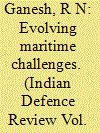

|
|
|
|
|
| Publication |
2009.
|
| Summary/Abstract |
When the Second World War ended and India became independent, we inherited a proportionate share of the combined military resources of British India, including naval resources that had been built upto serve the interests of the Empire. As far as India was concerned, the Navy inherited a collection of ships which lacked coherence as a fighting force, and in the prevailing situation its composition was not based on planned roles or strategic objectives.
|
|
|
|
|
|
|
|
|
|
|
|
|
|
|
|
| 4 |
ID:
139299
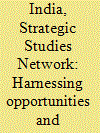

|
|
|
|
|
| Summary/Abstract |
Based on the work of the Maritime Security Working Group within the Strategic Studies Network (SSN), this report provides both diagnosis and prescriptions regarding security threats in the Indian Ocean Region (IOR). The IOR, a large maritime area that extends from coastal Africa through the Middle East and South Asia and on to Australia, is a major conduit for global trade, a littoral zone of developing powers, and the focus of a series of rising security challenges. Thus, not only is the security of the IOR of major importance for IOR littoral states, it is also of vital importance for much of landlocked Africa and Asia, along with major economic powers like China, the European Union and the United States.
This collaborative report highlights two overarching themes, the first being that the IOR, while of great importance to regional/global stability, needs to be conceived of as a key strategic zone. In short, security issues in the IOR must be addressed with a sense of urgency. The second theme is that this diverse region suffers from a lack of institutions capable of bridging gaps and easing tensions. The institutions that do exist are either ineffective or are of a very specific nature. Greater attention must be directed towards building shared perspectives on security issues, particularly as they relate to non-state or non-traditional threats.
This report reflects the desire of all participating experts in this Working Group to see comprehensive strategic assessments being developed within the global foreign policy community. Thus, this report is the start of strategic dialogues that hopefully will commence among IOR littoral states. The IOR is an essential conduit that draws in Europe, North America and the Asia-Pacific. It is too often conceived within the limitations of a sub-region (like South Asia, Eastern Africa or the Gulf). The IOR is full of threats, but it also offers attractive opportunities for enhancing global security. While the IOR’s littoral zones are often divided along national boundaries, the IOR is a huge maritime domain, where no single country can guarantee stability and where a maritime context may offer unique chances to bypass barriers inhibiting cooperation on land. The opportunity for enhancing security is there and it is hoped that this analysis can assist in the formation of policies that help all actors and nations.
|
|
|
|
|
|
|
|
|
|
|
|
|
|
|
|
| 5 |
ID:
133695
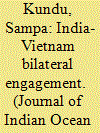

|
|
|
|
|
| Publication |
2014.
|
| Summary/Abstract |
Both India and Vietnam belong to a region that holds enormous potential, but also many challenges. We have a strong convergence of interests in working together, and with others in the region, for a stable, peaceful and prosperous Asia. ....Vietnam's emergence as one of the most vibrant economies in the Asia Pacific region is greatly welcomed by India, especially because we regard Vietnam as a trusted and privileged strategic partner and an important pillar of our Look East Policy".
|
|
|
|
|
|
|
|
|
|
|
|
|
|
|
|
| 6 |
ID:
126687
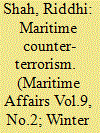

|
|
|
|
|
| Publication |
2013.
|
| Summary/Abstract |
Centre-state relations in India are a fascinating area of studies. The structure of the relationship has an effect on every single aspect of life as we know it in India. This paper is an attempt to study centre-state relations in the context of India's maritime counter-terrorism strategy. Although the Government of India has not publicly stated its counter-terrorism strategy on the sea, intelligence, information sharing, crisis response, finances for internal security and the nation's legislation for battling terrorism together comprise India's maritime-terrorism strategy. Through study of these areas, the paper argues that the centre-state divide has had systemic implications on India's maritime security and has largely done more harm than good to collective initiatives that aspire to prevent future risk of terrorism from the sea or on the sea.
|
|
|
|
|
|
|
|
|
|
|
|
|
|
|
|
| 7 |
ID:
106760


|
|
|
| 8 |
ID:
133169


|
|
|
|
|
| Publication |
2014.
|
| Summary/Abstract |
The commander of the Royal Netherlands Navy's (RNLA) submarine flotilla has spelled out of the requirements, opportunities and challenges attendant in plans to replace the service's four walrus-class boats after 2025.
|
|
|
|
|
|
|
|
|
|
|
|
|
|
|
|
| 9 |
ID:
133170


|
|
|
|
|
| Publication |
2014.
|
| Summary/Abstract |
Saab has received contracts worth SEK 467 million (USD 70.4 million) from the Swedish Defence Material Administration (FMV) to generate construction and production plans for the Royal Swedish Navy's next generation submarines and for the mid-life update of two type A19 Gotland class boat.
|
|
|
|
|
|
|
|
|
|
|
|
|
|
|
|
| 10 |
ID:
129186
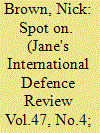

|
|
|
|
|
| Publication |
2014.
|
| Summary/Abstract |
Once considered inappropriate for the challenging environmental conditions encountered at sea, laser guided weapons are now increasingly being promoted for precision attack in the maritime domain. Nick Brown scouts out what has changed.
|
|
|
|
|
|
|
|
|
|
|
|
|
|
|
|
| 11 |
ID:
134016
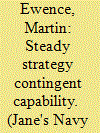

|
|
|
|
|
| Publication |
2014.
|
| Summary/Abstract |
As NATO shifts away from Afghanistan and from a land focus, Martin Ewence considers the maritime challenges facing the alliance, and assesses how the alliance maritime strategy can enable NATO to respond to change and risk at sea.
|
|
|
|
|
|
|
|
|
|
|
|
|
|
|
|
| 12 |
ID:
128109
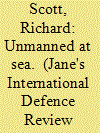

|
|
|
|
|
| Publication |
2012.
|
| Summary/Abstract |
Although long in the making, organic shipborne UAVs are only now beginning to gain the wider acceptance and understanding of the naval fraternity.
|
|
|
|
|
|
|
|
|
|
|
|
|
|
|
|
| 13 |
ID:
132406


|
|
|
|
|
| Publication |
2014.
|
| Summary/Abstract |
Pacific land issues are not only about Indigenous ownership in rural areas. Within urban areas in particular, land historically alienated into State control produced consequences only now being realised. In Fiji, all State land is claimed by communal landowners and such claims were said to be one reason for the 2006 coup. It has been suggested in recent times that urban informal settlements on the qoliqoli (coastal and foreshore land) are at risk and face increasing challenges from landowners. This paper examines a neglected area of urban State land in Fiji and comments on the future of the urban poor in Fiji if land tenure is unresolved.
|
|
|
|
|
|
|
|
|
|
|
|
|
|
|
|